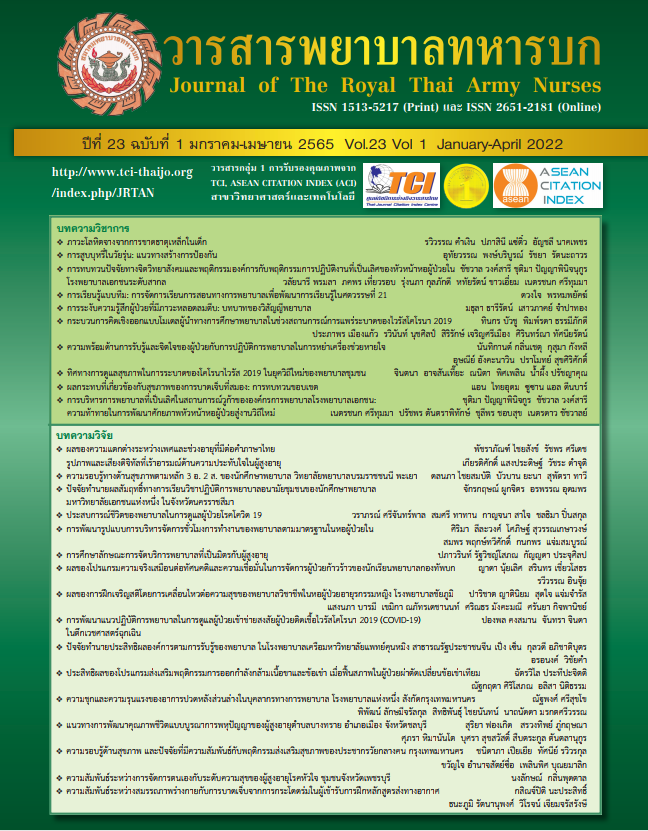Factors Influencing Media Literacy Skills in the 21st Century among Nursing Students HRH Princess Chulabhorn College of Medical Science, Chulabhorn Royal Academy
Keywords:
media literacy, the 21st century, nursing studentsAbstract
Media literacy is an essential skill in the 21st century. This skill enhances people to adapt and live happily in a disruptive world. This research aimed to study media literacy skill in the 21st century and its predictive factors among nursing students. The participants comprised 160 nursing students of faculty of nursing, HRH Princess Chulabhorn College of Medical Science, Chulabhorn Royal Academy. Data were collected through online questionnaires with 70 items. Using Descriptive statistics, Pearson’s correlation coefficient and stepwise multiple regressions were employed for data analysis.
The results revealed that media literacy skills in the 21st century on practice showed the highest scores (mean = 102.9, SD = 11.05) and the skill on situation were relatively good (mean = 20.09, SD = 3.11). There were 4 influencing factors on the media literacy skills in the 21st century including Performance Expectancy (β = .26) Facilitating Conditions (β = .22), Social Influence (β = .24), and Habituation (β = .19) (p<.05). Stepwise multiple regression analysis revealed that those aforementioned factors could explain 34.2% of variance in media literacy skills in the 21st century on practice (F = 20.139; p-value <.05). This research recommended that teaching and learning management model should encourage students to develop their skills in using information media and technology both in theory and practice by determination of learning outcomes in terms of knowledge, attitudes, and information media skills that increase the level of intensity in each school year.
Downloads
References
Office of the Education Council. National Education Plan in 2017-2029 BC. Ministry of Education. Bangkok: prigwhan graphics Co., Ltd. 2017. (in Thai)
Leo VA, Ilse M & Haedwijch V. Media Literacy Policy in Flanders Belgium: From Parliamentary Discussions to Public Policy. Journal of Media Literacy Education. 2018; 10(1): 59-81.
Eberhart G. Media Literacy in an Age of Fake News: American libraries magazine.org. 2019
Ptaszek G. In: Hobbs R, Mihailidis P. editors. Media literacy outcomes, measurement The international encyclopedia of media literacy. New york: Wiley Blackwell. 2019; 1067-1078.
Prachanban P, Kornpuang A. The Research and Development of the Measurement Instruments of the Media Literacy Skills in the 21st Century for Secondary Students. Faculty of Education. Naresuan University. 2015. (in Thai)
World Economic Forum. New Vision for Education: Fostering Social and Emotional Learning through Technology. Cologny/Geneva Switzerland: World Economic Forum. 2016.
Inthanon S, Sermsynsiri P. The Study of How Youth Can Protect Themselves From Cyberbullying. University of the Thai Chamber of Commerce. 2018; 2(2):1396-1406.(in Thai)
Vrabec N. The level of media literacy or children and aldolescents in Slovakia. 4th International Multidisciplinary Scientific Conference on Social Sciences & Arts SGEM. 2017; 17(1): 261-268.
Festl R. Social media literacy & adolescent social online behavior in Germany. Journal of Media Literacy Education. 2021; 15(1): 249-271.
Ku KYL, Kong Q, Song Y, Deng L, Kang Y, Hu A. What predicts adolescents’ critical thinking about real-life news? The roles of social media news consumption and news media literacy. Thinking Skills and Creativity. 2019; 33: 100570.
Wongkumsin T. Media Literacy Skills, Media Literacy and Emotional Quotient of Students at Kasetsart University. J. of Soc Sci & Hum. 2019; 45(2): 127-161. (in Thai)
Oducado RMF, Sales MR, Magarzo AJP, Panes PMA, Lapastora JTP. Perceptions and attitude on using social media responsibility:Toward social media literacy in nursing education. Belitung Nursing Journal. 2019; 5(3): 116-122.
Tubaishat A, & Habiballah L. eHealth literacy among undergraduate nursing students. Nurse Education Today. 2016; 42: 47-52.
Duangchan C, Kheokao J, Chamnansua P, Meebunmak Y, Howharn C, Chumchai P, et al. Factors Predicting eHealth Literacy of Nursing Students in Nursing Colleges underJurisdiction of Praboromarajchanok Institute. EAU Heritage Journal Science and Technology. 2017; 11(1): 235-248. (in Thai)
Venkatesh V., Thong J. and Xu Y. Consumer acceptance and use of information technology: Extending the unified theory of acceptance and use of technology” Behavioral Marketing eJournal. 2012; 36(1): 157-178.
Daniel WW, Cross CL. Biostatistics: Basic Concepts and Methodology for the Health Sciences 10 Ed. Singapore: John Wiley & Sons Inc. 2014.
Kim S, & Oh J. The Relationship between E-Health Literacy and Health-Promoting Behaviors in Nursing Students: A Multiple Mediation Model. Int J Environ Res Public Health. 2021; 18(11): 5804.
O’Connor S, Zhang M, Honey M, Lee JJ. Digital professionalism on social media: A narrative review of the medical, nursing, and allied health education literature. International Journal of Medical Informatics. 2021 Sep; 153: 104514.
Zou’bi, R. A. The impact of media and information literacy on acquiring the critical thinking skill by the educational faculty’s students. Thinking Skills and Creativity. 2021; 39: 100782.
Zuiderwijka A, Janssena M, Dwivedib YK. Acceptance and use predictors of open data technologies: Drawing upon the unified theory of acceptance and use of technology. Government Information Quarterly. 2015; 32: 429-440.
Cabrera-Sanchez J, Ramos AF, Liébana-Cabanillas FJ, Shaikh AA, Identifying relevant segments of AI applications adopters-Expanding the UTAUT2’s variables. Telematics and Informatics. 2021; 58: 101529.
Sarawut Rueangsawat, Papasinee Saetew, Piyarut Choome.The Effect of Blended learning management on 21st century learning skills for nursing students, Boromarajonani College of Nursing, SuratThani. Journal of The Royal Thai Army Nurses. 2020; 21 (1) :235-244. (in Thai)
Downloads
Published
How to Cite
Issue
Section
License
Copyright (c) 2022 Journal of The Royal Thai Army Nurses

This work is licensed under a Creative Commons Attribution-NonCommercial-NoDerivatives 4.0 International License.
บทความหรือข้อคิดเห็นใดใดที่ปรากฏในวารสารพยาบาลทหารบกเป็นวรรณกรรมของผู้เขียน ซึ่งบรรณาธิการหรือสมาคมพยาบาลทหารบก ไม่จำเป็นต้องเห็นด้วย
บทความที่ได้รับการตีพิมพ์เป็นลิขสิทธิ์ของวารสารพยาบาลทหารบก
The ideas and opinions expressed in the Journal of The Royal Thai Army Nurses are those of the authors and not necessarily those
of the editor or Royal Thai Army Nurses Association.






